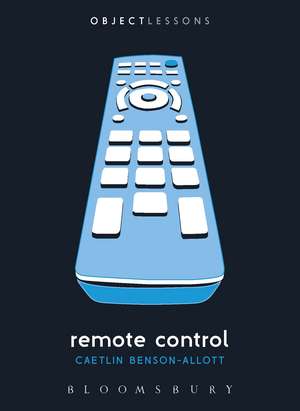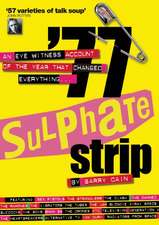Remote Control: Object Lessons
Autor Caetlin Benson-Allotten Limba Engleză Paperback – 28 ian 2015
Din seria Object Lessons
- 39%
 Preț: 47.19 lei
Preț: 47.19 lei - 40%
 Preț: 46.62 lei
Preț: 46.62 lei - 39%
 Preț: 46.74 lei
Preț: 46.74 lei - 39%
 Preț: 47.62 lei
Preț: 47.62 lei - 40%
 Preț: 45.85 lei
Preț: 45.85 lei - 39%
 Preț: 47.19 lei
Preț: 47.19 lei - 39%
 Preț: 47.62 lei
Preț: 47.62 lei - 39%
 Preț: 47.62 lei
Preț: 47.62 lei - 39%
 Preț: 47.19 lei
Preț: 47.19 lei - 39%
 Preț: 47.62 lei
Preț: 47.62 lei - 39%
 Preț: 46.74 lei
Preț: 46.74 lei - 39%
 Preț: 47.19 lei
Preț: 47.19 lei - 39%
 Preț: 47.19 lei
Preț: 47.19 lei - 42%
 Preț: 47.19 lei
Preț: 47.19 lei - 39%
 Preț: 46.74 lei
Preț: 46.74 lei - 39%
 Preț: 46.74 lei
Preț: 46.74 lei - 39%
 Preț: 47.19 lei
Preț: 47.19 lei - 39%
 Preț: 47.62 lei
Preț: 47.62 lei - 39%
 Preț: 47.62 lei
Preț: 47.62 lei - 39%
 Preț: 47.62 lei
Preț: 47.62 lei - 39%
 Preț: 46.74 lei
Preț: 46.74 lei - 39%
 Preț: 46.74 lei
Preț: 46.74 lei - 39%
 Preț: 46.74 lei
Preț: 46.74 lei - 39%
 Preț: 47.62 lei
Preț: 47.62 lei - 39%
 Preț: 47.19 lei
Preț: 47.19 lei - 39%
 Preț: 47.19 lei
Preț: 47.19 lei - 39%
 Preț: 46.74 lei
Preț: 46.74 lei - 39%
 Preț: 47.62 lei
Preț: 47.62 lei - 39%
 Preț: 46.74 lei
Preț: 46.74 lei - 39%
 Preț: 46.74 lei
Preț: 46.74 lei - 40%
 Preț: 46.29 lei
Preț: 46.29 lei - 39%
 Preț: 46.74 lei
Preț: 46.74 lei - 39%
 Preț: 47.19 lei
Preț: 47.19 lei - 39%
 Preț: 47.19 lei
Preț: 47.19 lei - 40%
 Preț: 45.85 lei
Preț: 45.85 lei - 39%
 Preț: 47.62 lei
Preț: 47.62 lei - 39%
 Preț: 46.74 lei
Preț: 46.74 lei - 39%
 Preț: 47.37 lei
Preț: 47.37 lei - 39%
 Preț: 47.19 lei
Preț: 47.19 lei - 43%
 Preț: 46.74 lei
Preț: 46.74 lei - 39%
 Preț: 47.62 lei
Preț: 47.62 lei - 39%
 Preț: 46.74 lei
Preț: 46.74 lei - 39%
 Preț: 47.62 lei
Preț: 47.62 lei - 39%
 Preț: 47.25 lei
Preț: 47.25 lei - 39%
 Preț: 46.74 lei
Preț: 46.74 lei - 39%
 Preț: 47.53 lei
Preț: 47.53 lei - 39%
 Preț: 46.74 lei
Preț: 46.74 lei - 39%
 Preț: 47.62 lei
Preț: 47.62 lei - 39%
 Preț: 47.19 lei
Preț: 47.19 lei
Preț: 47.62 lei
Preț vechi: 77.68 lei
-39% Nou
Puncte Express: 71
Preț estimativ în valută:
9.11€ • 9.51$ • 7.54£
9.11€ • 9.51$ • 7.54£
Carte disponibilă
Livrare economică 14-28 martie
Preluare comenzi: 021 569.72.76
Specificații
ISBN-13: 9781623563110
ISBN-10: 1623563119
Pagini: 184
Ilustrații: 25 halftones
Dimensiuni: 121 x 165 x 15 mm
Greutate: 0.18 kg
Editura: Bloomsbury Publishing
Colecția Bloomsbury Academic
Seria Object Lessons
Locul publicării:New York, United States
ISBN-10: 1623563119
Pagini: 184
Ilustrații: 25 halftones
Dimensiuni: 121 x 165 x 15 mm
Greutate: 0.18 kg
Editura: Bloomsbury Publishing
Colecția Bloomsbury Academic
Seria Object Lessons
Locul publicării:New York, United States
Caracteristici
Historical context for a familiar object helps readers evaluate their relationship to current mass culture
Notă biografică
Caetlin Benson-Allott is Associate Professor of English at Georgetown University, USA. She is the author of Killer Tapes and Shattered Screens: Video Spectatorship from VHS to File Sharing (University of California Press, 2013) and of a column on film and new media in Film Quarterly.
Cuprins
Introduction: What a Mess!Chapter 1: Changing VolumeChapter 2: Switching ChannelsChapter 3: Comprehensive ControlConclusion: Material LiteracyIndex
Recenzii
The remote control encourages us to take it for granted. It's ubiquitous but easy to misplace. An essential convenience but still an overly complicated nuisance. But in this compelling history, Caetlin Benson-Allott places remote controls at the center of our media universe, demonstrating how profoundly these devices shape contemporary media practices and our everyday lives. You'll never surf the same way again.
While promising control, the remote often fails to recognize commands or deliver our desires. Caetlin Benson-Allott shows how the history of the remote, including its affordances and burdensome proliferations, can help us better understand contemporary media technologies.
Caetlin Benson-Allott offers an analysis of 'remote control' as a 'technology and a cultural fantasy.' .What was once a fantasy, a thing of the imagination, becomes instead an instrument, but by that instantiation it scrambles and reduces the myriad imaginative uses it once anchored - realizes some, sends others packing, or separates them out.
Object Lessons' describes themselves as 'short, beautiful books,' and to that, I'll say, amen. . [I]t is in this simplicity that we find insight and even beauty. . Remote Control by Caetlin Benson-Allott is another pleasure, walking us through the history of one of my favorite objects, with a history dating to the 1920s. In the middle to late 1970s, I was actually employed as a remote control, as my father would say, "John, change the channel to 7," or "Put it on 9," and my job would be to get up and change the channel to 7 or 9. I was relieved to be replaced by an infrared model in the 1980s. . If you read enough 'Object Lessons' books, you'll fill your head with plenty of trivia to amaze and annoy your friends and loved ones - caution recommended on pontificating on the objects surrounding you. More importantly, though, in the tradition of McPhee's Oranges, they inspire us to take a second look at parts of the everyday that we've taken for granted. These are not so much lessons about the objects themselves, but opportunities for self-reflection and storytelling. They remind us that we are surrounded by a wondrous world, as long as we care to look.
While promising control, the remote often fails to recognize commands or deliver our desires. Caetlin Benson-Allott shows how the history of the remote, including its affordances and burdensome proliferations, can help us better understand contemporary media technologies.
Caetlin Benson-Allott offers an analysis of 'remote control' as a 'technology and a cultural fantasy.' .What was once a fantasy, a thing of the imagination, becomes instead an instrument, but by that instantiation it scrambles and reduces the myriad imaginative uses it once anchored - realizes some, sends others packing, or separates them out.
Object Lessons' describes themselves as 'short, beautiful books,' and to that, I'll say, amen. . [I]t is in this simplicity that we find insight and even beauty. . Remote Control by Caetlin Benson-Allott is another pleasure, walking us through the history of one of my favorite objects, with a history dating to the 1920s. In the middle to late 1970s, I was actually employed as a remote control, as my father would say, "John, change the channel to 7," or "Put it on 9," and my job would be to get up and change the channel to 7 or 9. I was relieved to be replaced by an infrared model in the 1980s. . If you read enough 'Object Lessons' books, you'll fill your head with plenty of trivia to amaze and annoy your friends and loved ones - caution recommended on pontificating on the objects surrounding you. More importantly, though, in the tradition of McPhee's Oranges, they inspire us to take a second look at parts of the everyday that we've taken for granted. These are not so much lessons about the objects themselves, but opportunities for self-reflection and storytelling. They remind us that we are surrounded by a wondrous world, as long as we care to look.







